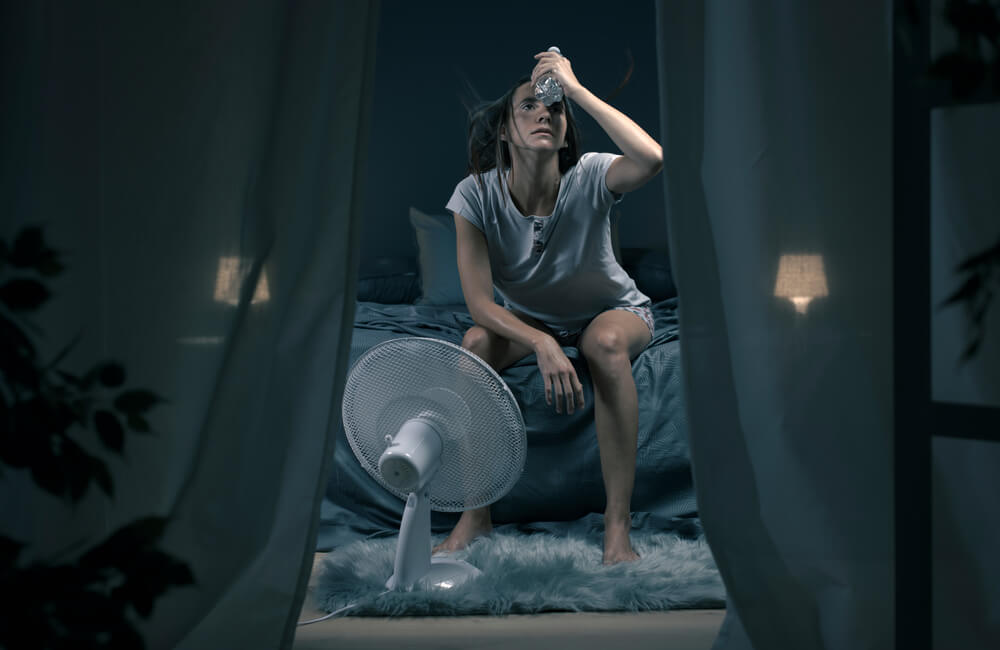The increase or decrease of normal hormonal levels in the blood leads to hormonal imbalance. Essentially, the endocrine glands produce chemicals, i.e., hormones, that then guide the function of the tissues, cells, and organs. In that sense, hormones are responsible for regulating many different bodily functions such as stress and mood, sleep and growth, metabolism, body temperature, heart rate, and reproductive cycles. It’s perfectly normal for women to experience occasional fluctuation of hormones, especially during periods such as menstruation, pregnancy, and menopause. The actual hormonal imbalance typically affects steroid and growth hormones, adrenaline and insulin, as well as ovary-produced progesterone or estrogen. In order to learn more about signs of hormonal imbalance, what causes hormonal imbalance, whether hormone imbalance can cause weight gain, as well as available treatments, keep on reading.
Hormonal Imbalance Symptoms

Hormonal imbalance symptoms are many. Some of the most common involve mood swings, fatigue, bloating, and weight gain. Irregular periods are also associated with hormonal imbalance. Having to deal with these symptoms on a daily basis can considerably affect a woman’s health and wellness and even her work and relationships. That said, the reported hormonal imbalance symptoms in women include:
- Night sweats and poor sleep
- Mood swings and depression
- Weight gain or loss
- Bloating and face swelling
- Dry skin and rashes
- Appetite changes and increased thirst
- Constant fatigue and concentration issues
- Hair thinning and loss
- Headaches and sore breasts
- Neck bulges and weakened bones
- Lack of libido
- Infertility
- Changes in heart rate and blood sugar levels
- Frequent need to urinate
- Problems with vision
- Voice deepening
- Clitoris enlargement
- Changes in heat/cold sensitivity
What Causes Hormonal Imbalance?
As mentioned, women will often notice signs of hormonal imbalance at certain life stages such as puberty, pregnancy, and menopause, as well as during menstruation. These slight fluctuations are normal. However, lifestyle choices, environment, and certain medical conditions can be what causes hormonal imbalance in a more serious manner. The most common causes in that sense include:
- Anorexia and an unhealthy diet in general
- Increased body fat levels
- Too much stress
- Severe infections and allergic reactions
- Endocrine gland injuries
- Under or overactive thyroid
- Pancreas inflammation
- Type 1 and 2 diabetes
- Pollutants and toxins in the environment
- Birth control or hormonal replacement meds
- Benign cysts and tumors
- Cancer and chemotherapy
- Turner or Prader-Willi syndromes
- Abnormal levels of cortisol, aldosterone, and parathyroid hormones
- Anabolic steroid meds abuse
- Increased glucagon or insulin levels
- Iodine deficiency
- Certain medication
Some medical conditions such as polycystic ovary syndrome (PCOS), primary ovarian insufficiency (POI), ovarian cancer, and early menopause can also be the cause of hormonal imbalance in women.
The first common signs of hormonal imbalance that a woman should notice typically involve unexplained mood swings and irregular periods. Periods can also be rather painful, accompanied by heavier bleeding than usual. PMS symptoms tend to get suddenly worse as well. Other very noticeable signs that point to hormonal imbalance include sudden changes in the skin, such as acne, as well as sudden weight gain.
If you or someone you care about is experiencing any gynecological problems, be that hormonal imbalance symptoms or something else, don’t hesitate to get in touch with Dr. Krinsky at Gynecology and Women Wellness, a renowned male gynecologist in South Florida. Years of experience and highly skilled practice allowed him to help hundreds of women enjoy a healthy life to the fullest.
Can Hormone Imbalance Cause Weight Gain?
You could probably guess from the previous information that hormone imbalance can cause weight gain. This is primarily because of hormones’ huge impact on one’s metabolism. For instance, if the main cause of hormonal imbalance is PCOS, the affected woman will probably suffer from a lack of insulin sensitivity. Since insulin is responsible for regulating blood sugar, the consequence of poor insulin sensitivity can be weight gain.
Treatment for Hormonal Imbalance

There are different kinds of treatment available for hormonal imbalance, depending on what has caused the imbalance in the first place. What’s more, these treatments have to be specifically tailored to individuals as every woman can react differently and may require a different approach. In general, positive lifestyle changes together with medical treatment are the best solutions for long-term success. That said, some of the common medical treatments in case of hormonal imbalance are as follows:
- Birth or hormone control meds typically contain progesterone and estrogen. These meds can help regulate the female menstrual cycle and associated symptoms. There are several options available in this case as well, such as pills, shots, IUDs, patches, and rings.
- Hormone replacement meds can minimize the menopausal symptoms for a while, such as night sweats and hot flashes.
- Anti-androgen meds reduce the androgen hormone, thus minimizing severe hair loss/growth and acne.
- Vaginal estrogen that’s applied as a cream straight to the vaginal tissue. Rings and tablets that contain estrogen can also minimize vaginal dryness.
- Letrozole and clomiphene are meds that can accelerate and induce ovulation in women who suffer from PCOS. Gonadotropin injections can also boost the chances of conceiving.
- When pregnancy is concerned, IVF may also help women affected by PCOS.
- Metformin is a med recommended to women suffering from Type 2 diabetes as it can reduce blood sugar.
- Levothyroxine, typically found in hypothyroidism meds, can consequently manage the hormonal imbalance as well.
Changing your lifestyle habits can also make a significant difference in regard to hormonal imbalance. That said, the positive habits and changes include:
- Losing weight as necessary and maintaining a healthy weight
- Engaging in a regular exercise routine
- Following a nutritious and balanced diet
- Practicing calming activities and hobbies in order to manage and reduce stress
- Practicing regular skincare routine, with appropriate skincare products
- Removing spicy drinks and foods from one’s diet
- Cutting down the consumption of packaged and sugary foods
- Replacing old non-stick pans with ceramic ones for cooking
- Buying pesticide-free, organic fruits, and veggies
- Minimizing the use of home cleaners that contain toxic chemicals
- Going in for regular doctor’s appointments
It’s not uncommon to experience hormonal imbalance at least once or twice in one’s life. Of course, the most likely periods for this to happen include puberty, menstruation, pregnancy, and menopause. However, some women tend to suffer from continual hormonal imbalance, especially if the imbalance was caused by some other medical condition or external factors, such as issues with endocrine glands or stress and medication. Don’t hesitate to seek medical help if the symptoms of hormonal imbalance persist for a long time and start affecting your daily life.
However, there’s no need to panic. Hormonal imbalance is typically rather easy to manage with the right treatment, as long as you take the time to visit your doctor so that they can assess the situation and pinpoint the exact cause of it. These days, gynecological care has come a long way and provides women with many updated treatment options that can help them keep their gynecological and reproductive health in check.


